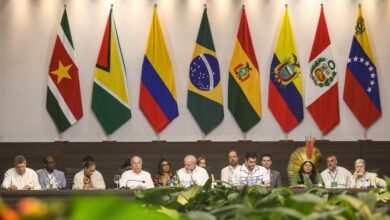Buenos Aires–Argentina and Uruguay said Monday they were joining Brazil in recognizing an independent Palestinian state, earning praise from Palestinian officials but an immediate sharp rebuke from Israel.
Israel called the announcement by Buenos Aires "regrettable" and said it went against an Israeli-Palestinian agreement that such a state should only be recognized with Israeli approval.
That echoed criticism Israel made after Brazil started the South American movement on Friday by saying it recognized a Palestinian state based on 1967 borders, before the Six Day War in which Israel seized Gaza and the West Bank.
But Palestinian leader Mahmud Abbas, on a visit to Turkey, expressed his "pride" over the decision by Buenos Aires, according to an official statement.
His foreign minister, Riad al-Malki, told AFP the Palestinians had expected that "Paraguay and other Latin American countries will make similar decisions."
"The Argentine government recognizes Palestine as a free and independent state within the borders defined in 1967," Argentine Foreign Minister Hector Timerman said, reading a letter sent by President Cristina Kirchner to Abbas.
Timerman said the recognition reflected a general consensus among members of Mercosur, the South American trade bloc.
Uruguay announced soon afterward it will recognize a Palestinian state next year.
"Uruguay will surely follow the same path as Argentina in 2011," deputy foreign minister Roberto Conde told AFP. "We are working towards opening a diplomatic representation in Palestine, most likely in Ramallah."
Argentina, Brazil, Paraguay and Uruguay all make up Mercosur. Venezuela's membership is pending.
The move is based on a "deep desire to see a definitive advance in the negotiation process leading to the establishment of a just and durable peace in the Middle East," Timerman said.
But Israeli foreign ministry spokesman Yigal Palmor told AFP: "This regrettable decision will not help at all to change the situation between Israel and the Palestinians."
Israel has already reacted with "sadness and disappointment" to Brazil's declaration on the issue, saying it breached a 1995 agreement it had with the Palestinian Authority that any Palestinian state should only come about through negotiations with it.
US lawmakers have also called Brazil's decision "severely misguided" and "regrettable."
Western countries have agreed that any definition of a Palestinian state required Israeli approval. The United States has consistently protected Israel's position in the UN Security Council.
Brazilian President Luiz Inacio Lula da Silva, who had sought a mediator role in the Israeli-Palestinian situation, made his decision shortly before he is to stand down on January 1 next year.
His protegee and former cabinet chief, Dilma Rousseff, has been elected to take over from him. She has pledged to pursue his policies.
The announcements by Brazil, Argentina and Uruguay come as peace talks between Israel and the Palestinians teeter on the brink of collapse following the end of the temporary ban on Jewish settlements in the West Bank.
Israeli Foreign Minister Avigdor Lieberman said Monday he did "not see any reason" to extend the settlement freeze.
Abbas has said the Palestinian side will not return to negotiations while Israel continues to build on land the Palestinians want for their state.
He has repeatedly said he would explore other options if the peace talks collapse — including asking for UN recognition of a Palestinian state based on the 1967 borders.




